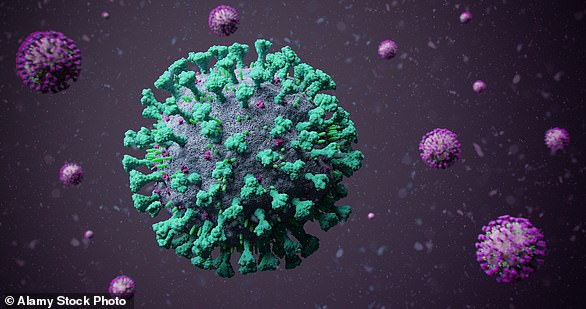Backlash as Covid cases in arrivals from China will NOT be forced to isolate
>
Ministers are facing a backlash tonight after it emerged travellers from China who test positive for Covid on arrival will not be forced to self-isolate.
From Thursday passengers will need a negative test before they can fly to the UK from the Chinese mainland.
There will also be random testing on arrival with samples checked for signs of new variants, as the disease runs riot following Beijing’s dramatic lifting of restrictions.
However, MPs have voiced concern as people will not be obliged to agree to tests on arrival. Even if travellers do take them and are positive, they will not have to self-isolate.
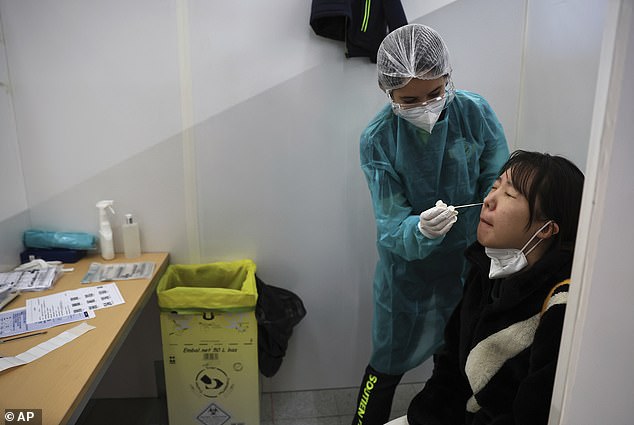
A passenger arriving from China is tested for Covid at the Charles de Gaulle airport in Paris on Sunday
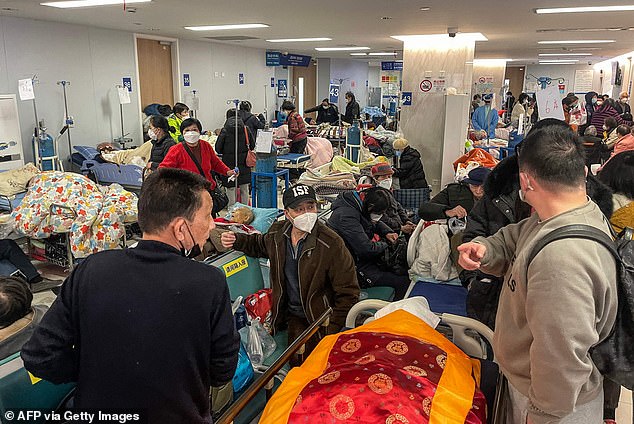

Covid patients on stretchers line the emergency ward at Tongren hospital in Shanghai, China, today
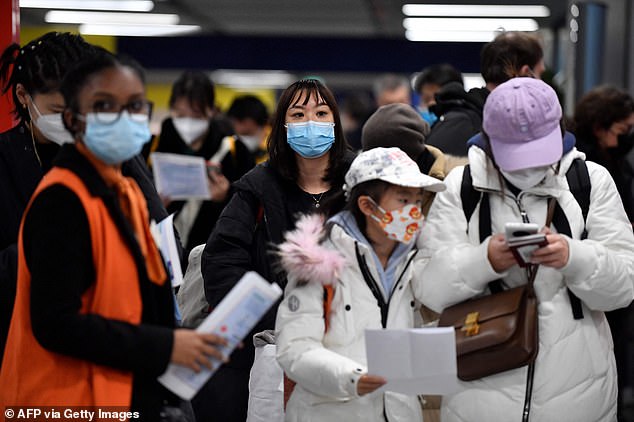

Passengers from China wait in line for their Covid vaccination documents to be checked at Charles de Gaulle airport
London Heathrow and Manchester are the only two airports direct Chinese flights arrive at.
Should passengers test positive before flying, they will not be allowed to travel.
Ministers have said they plan to test a ‘sample’ of passengers on arrival in the UK to check for variants — such as XBB.1.5, which has been nicknamed ‘the Kraken’.
But people coming from China will be allowed to refuse a second PCR test if they choose, raising the risk they could be positive and go undetected.
And, in stark contrast to other countries, passengers who test positive on arrival will not have to self-isolate.
A DHSC spokesman said: ‘We encourage people at the border to take a test to help themselves, their families and wider knowledge on Covid.
‘However the testing is optional and people can decline if they wish to do so.’
Asked if passengers who test positive would be required to quarantine, Transport Secretary Mark Harper told LBC: ‘No, because what we are doing is we are collecting that information for surveillance purposes.
‘But, look, one in 45 people in the United Kingdom have got Covid at the moment.’
Downing Street indicated that full details of the regime will be given shortly, and plans for travellers from Hong Kong are also imminent.
The PM’s official spokesman said: ‘We’re working on the final details of the implementation of the policy, and that includes on Hong Kong, and we will update in due course.’
He said that the Government was in discussions with Chinese officials regarding the new policy, but that he was not yet aware of any ‘significant improvement’ in Chinese information-sharing at this point.
The spokesman played down the prospect of travel restrictions spreading to other countries with high Covid rates.
‘A part of the reason for this was because of a lack of comprehensive health information being shared,’ the spokesman said.
‘We’re working with the Chinese government to encourage them – we’re not alone in this – to get more information from them.’
Labour MP Rachel Maskell, who serves on the Health Select Committee, told MailOnline that it made sense to oblige arrivals from China to self-isolate if they test positive.
She also suggested there needed to be a ‘discussion’ about bringing back compulsory rules more widely.
‘Obviously, we need people to isolate if they have got COVID. It’s really important that they don’t spread that to vulnerable people because then we’re going to be even in a worse crisis in the NHS.
‘So we have to follow through the logic of what this means if people don’t isolate versus if people do.
‘The whole testing regime was the indicator of actually saying, ‘we can release people who are well’ – which is a very positive thing, obviously recognising there is minimal risk, but there is some risk.
‘If people are poorly, then the risks obviously escalate and the impact on others then, is quite significant.
‘So the principles which public health applied, should not change whatever stage you are of a communicable disease process. And of course, there are other communicable diseases out there.’
Ms Maskell said the point of testing was to ensure life ‘doesn’t continue as normal’ for those who are positive.
‘I think it’s a particularly pernicious variant, which is the concern out of China, and therefore I agree, the whole point of testing is to know that there is a disease present, which says life doesn’t continue as normal if there is disease present…
‘That conversation doesn’t seem to be happening at the heart of government, and it should because our NHS is just so broken at the moment.’
Asked whether self-isolation should be compulsory across the board again, Ms Maskell said it was one of the main tools in controlling infection spread along with masks and immunisation.
‘Ultimately, public health is about managing risk. And at the moment, it feels like there’s a distraction from certainly the focus government were giving COVID and other communicable diseases,’ she said.
‘Now people are out and about, we know flu is really spiking now. It’s really concerning because people will die if they can’t get into the NHS when they need it, particularly people with a bad bout of community-acquired pneumonia or something.
‘And that’s what I’m really concerned about. How do we keep people well, keep people alive and protect people when the NHS is just so vulnerable at the moment?’
She added of obligatory self-isolation: ‘I think it’s got to be discussed. I don’t think you can avoid it. What’s the point in testing and knowing someone’s positive if nothing changes? It’s a futile exercise.’
However, Paul Hunter, Professor in Medicine at UEA, played down the need for more screening.
‘We have known from well before Covid that point of entry/point of exit screening for infectious diseases is ineffective at controlling the international spread of infectious diseases…
‘As I understand it all travellers from China will still need negative tests to board a plane. The point of entry testing was only ever intended to be a sample of arriving travellers in order to get more information on circulating variants in China, not as an attempt to control introduction of infections into the UK.
‘Strict border control measures have been shown to keep infections out as shown by New Zealand and China. But they have to be very strict and apply to all travellers not just those from the target country.
‘At the start of the pandemic the great majority of infections imported into the UK came from France, Italy and Spain and not China. Anything less than that and at best border controls merely delayed infections not prevented them.
‘Even if we did import infections from China, circulating variants in China are those we have in the UK and so are unlikely to have a big impact…
‘The main future concern for the UK at present is the XXB.1.5 variant which was probably introduced into the UK from the United States and is now increasing.’
The new travel restrictions were announced on December 30 because of fears China’s outbreak could introduce a dangerous new variant in the UK.
Other countries — including the US, Canada, Italy, Japan, India, Spain, South Korea, Malaysia and France — all brought in similar measures to deal with the threat of potential doomsday strains.
Covid is currently overwhelming hospitals in China after cases surged in the country when Beijing’s controversial ‘zero-Covid’ policy was lifted last month.
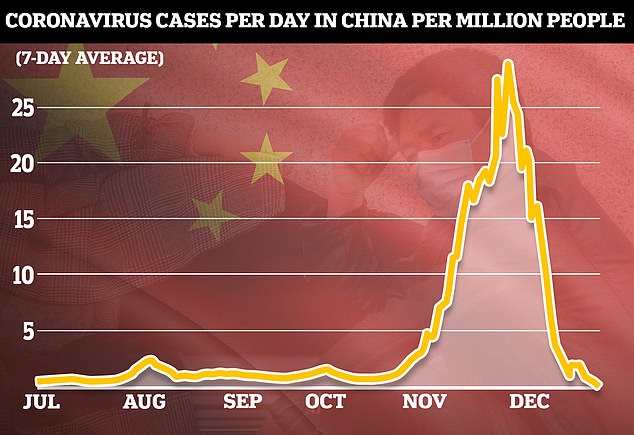

The Our World in Data graph shows the daily confirmed Covid cases in China. The Chinese Center for Disease Control and Prevention last week stopped reporting daily cases, without providing a reason. It reported around 5,000 cases per day last week and a small number of deaths. However, some estimates suggest China is actually experiencing one million cases per day and 5,000 deaths
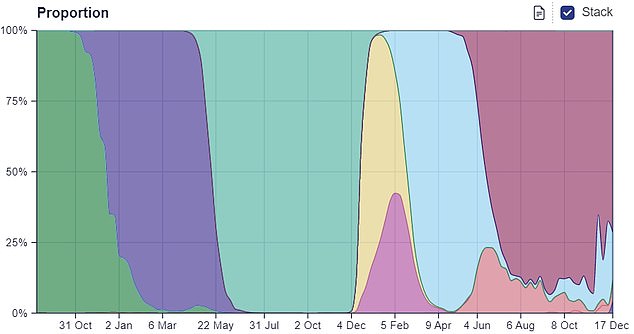

Figures from the Sanger Institute, one of the UK’s largest Covid surveillance centres, shows 4 per cent of cases in the week to December 17 were caused by XBB.1.5 (shown in purple, bottom right corner)
Experts believe low vaccination levels combined with weak natural immunity caused by delaying lifting the policy is behind the sudden rise.
But they also fear the latest wave — which is thought to be causing more cases than ever in the country — could spawn the perfect breeding ground for a new variant.
China has also been accused of under-reporting its cases and withholding virus samples, reducing the likelihood of any new variant being spotted.
XBB.1.5 has already caused alarm in the US over its quick spread and a recent rise in hospital admissions. It is behind four in ten cases in the country, up from two a week ago.
The variant, which is a version of Omicron, has mutations that help it dodge protection from vaccination and prior infections. It has been spotted in Shanghai but it is not clear yet how dominant it might be in the country because of low testing.
Experts yesterday told MailOnline that the strain is a ‘wake-up call’ and could worsen the NHS crisis, which has seen the health service battered by a ‘twindemic’ of Covid and flu.
The pressure on the NHS — thought to be higher than during the peak of the pandemic — has already led to new Government advice to wear a face mask if you feel unwell.
Meanwhile, Beijing is planning to ease its own international travel restrictions on January 8, allowing more citizens to go to the UK and other countries.
Countries such as Japan are testing all passengers that have been in mainland China in the last seven days and will quarantine them if they test positive.
Asked about the UK’s policy, Mr Harper said: ‘We manage Covid now by making sure we have got very high levels of vaccination, that is why people who are at risk, older members of the community for example, should make sure they get their fourth booster shot this winter.
‘That is how we protect people from Covid, that is our primary line of defence.
‘The policy for arrivals from China is primarily about collecting information that the Chinese government are not sharing with the international community.’
Mr Harper said the UK Government has created a ‘sensible, balanced proposition’ to deal with the potential spread of Covid from China.
He said: ‘This is about a country, China, which isn’t sharing the health data with the global health system that we expect everybody to do.
‘That is why we have put this temporary precautionary measure in place as China opens up its borders.
‘We are doing two things — we are requiring people who fly from China to have a pre-departure test so they have got to show that they are negative before they get on that flight, and when they get to the United Kingdom the UK Health Security Agency will take a sample of passengers and test them.
‘That is so that we get that information into our health system and we can track the virus that is coming from China.
‘That, I think, is a very sensible, balanced proposition which I think helps keep people in the UK safe but doesn’t put any restrictions on how people in the UK are able to operate.’
Mr Harper also said wearing a face mask is ‘sensible’ if people need to go out while ill.
Asked if he would wear a mask if he had coronavirus, he told LBC: ‘First of all you should stay at home if you think you have got Covid or you have got flu — actually the most sensible thing to do is to not go out and spread it.
‘If you do go out, clearly wearing a mask is very sensible if you are ill. But we manage these illnesses now by vaccination.
‘People should get vaccinated for Covid, they should also get a flu vaccination. We have seen very high levels of flu this winter.’

